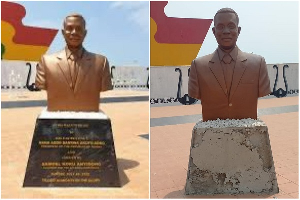The annual value of trade between Ghana and Turkey is set to hit US$900million and cross the US$1billion mark by the close of 2025 and 2027 respectively, said the Ghana-Turkey Chamber of Commerce.
As of 2020 the total trade value between Ghana and Turkey stood at US$771million, a marked increase from US$479million in 2016. Notably, in 2019 the country became Turkey’s third-biggest trading partner in sub-Saharan Africa. It however took a dip in 2021 and 2022, as global conditions prevailed.
The Chamber’s Chief Executive Officer, Dr. Daniel Amateye Anim-Prempeh, stated that while the current trend of trade between the two nations is promising, improving relations and expanding areas of trade guarantee that it will grow at a faster rate.
“The pandemic further solidified this relationship, as during its peak, Turkey became Ghana’s second most important trading partner… It is expected that Ghana’s trade volume will increase 200 percent by 2025,” he said in reference to a partnership agreement signed in 2020.
Historically, Ghana has primarily exported cocoa beans, cocoa paste and soybeans to Turkey, with the export value showing consistent growth at an annualised rate of 11.3 percent. Conversely, Turkey’s key exports to Ghana have included cement, pasta and building materials.
He said the exchange of services between the two nations however remains relatively low. Consequently, Dr. Anim-Prempeh highlighted the numerous opportunities for Ghanaian businesses in Turkey’s dynamic manufacturing sector.
“Turkey produces high-quality goods at competitive prices, and its strategic location makes it a very competitive country to do business with,” the Chamber’s CEO explained.
However, he acknowledged challenges such as delays in entry clearance processing and high visa fees, which can impede business transactions.
“In every endeavour there are bottlenecks; simply put challenges, feedback and complaints from Ghanaian businesses are that it takes time for the embassy in Accra to process their entry clearance. Equally, we have received complaints from our Turkish counterparts about high visa fees charged by our embassy in Ankara. To my mind, such developments may impede the smooth facilitation of business transactions,” he elaborated.
Chamber’s role
The Ghana-Turkey Chamber of Commerce is actively working to promote and facilitate trade between the two nations, he added.
Dr. Anim-Prempeh emphasised his outfit’s efforts to build strategic relationships with government institutions, including the Ministry of Trade and Ghana Investment Promotion Centre.
“We are fostering relationships with the Ghana Union of Traders Association (GUTA), Association of Ghana Industries and the Importers and Exporters Association, as well as other key associations and individual businesses within the economy. With our Turkish counterparts, the Chamber has worked with the Foreign Economic Relations Board (DEiK) and other Turkish National Chambers, and is still taking steps to enhance relationships that will facilitate trade between the two countries. Our focus is also on attracting Turkish firms to establish their presence in the economy, thereby creating direct employment for Ghanaians,” he explained.
Moreover, the Chamber is actively promoting education ties. Turkey offers quality higher education, and the Ghana-Turkey Chamber of Commerce is organising education fairs for Turkish universities in Ghana that encourage students to consider Turkey as an attractive educational destination.
This comes as Foreign Direct Investment (FDI) from Turkey in Ghana has already made an impact, with revenue from Turkish companies operating in various sectors and investments estimated at US$112million.
The Chamber hopes to attract more Turkish firms, particularly in the manufacturing sector, to capitalise on Ghana’s stable political environment, favourable investment laws and growing business environment, he added.
Tourism
Tourism is seen as another avenue to strengthen bilateral relations. Both countries boast rich cultural, historical and tourist sites.
Dr. Anim-Prempeh noted that Turkey hosted about 51.7 million tourists in 2019, and emphasised the potential for medical, sports and business tourism. Collaboration in this sector, including efforts by Turkish Airlines aimed at encouraging Ghanaians to visit Turkey, is expected to enhance bilateral relations.
“My visit to Turkey put me in a position to boldly state that they have developed their tourist sector with first-class roads to the tourist sites, and available and affordable hotels for all levels of income – hence the need to learn and leverage on it. Medical, sports and business tourism is an area worth considering. Indeed, it is estimated that Turkey is one of the prominent health tourism destinations in the world – which operates about 1,500 world-class hospitals and about 160,00 doctors, making it capable of providing high-standard health care delivery,” he further stated.
Business News of Monday, 18 September 2023
Source: thebftonline.com

















